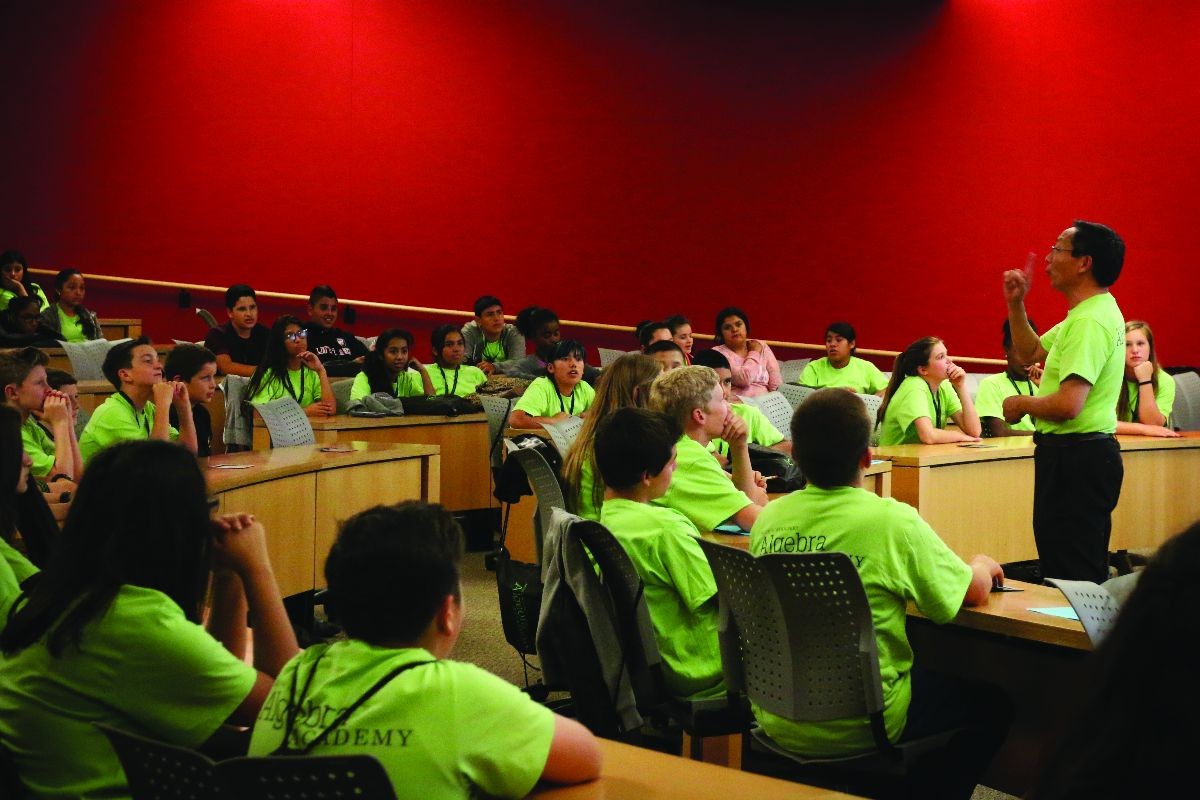CSUMB Magazine
Making numbers add up
Professor Hongde Hu is the chair of the math and statistics department at Cal State Monterey Bay. His efforts have helped make the university a national leader in developmental math education. The university’s Math Huge developmental program was recognized with a California Innovation Grant in 2015. Hu works on math boot camps for incoming college students, as well as summer programs for middle and high schoolers. His teaching load includes the freshman course for students who need more preparation to succeed in college-level math.
When students do well, they feel very powerful.— Hongde Hu, math and statistics department chair
We talked with him about math anxiety and how he helps turn students who are uncertain about their math skills into willing math learners, even math majors.
A lot of people have math anxiety; they have convinced themselves they just can’t ever get math. Why do you think that is?
Hu: A significant proportion of students have negative mathematics experiences and inadequate mathematical preparation. The problem is historical and systemic, and the students most disaffected by the current system are overwhelmingly Latino, immigrant or first-generation college students. I worked with high school and middle school students over the past twelve years. For those kids struggling in math, you can’t say they are good or not at math, because they haven’t really had a chance to learn. Our job is to get them excited about math.
What we find is that a lot of the students don’t have the solid foundation. Once we help them build that foundation, we can get them excited about math. They may come in not being able to solve a basic equation, but after one week or a couple weeks, they find math is much more enjoyable.
It is just like swimming; you have to learn the basics and have some success. Then it comes much easier.

I have watched your summer classes. Here are middle school and high school students, during the summer, learning about math, and they seem to be very excited about it. How do you do that?
Hu: First, it is a new environment for them to come to a university with innovative classrooms and faculty, so that’s exciting for them. They get to know what a university education looks like. And we work on very interesting math problems in group to increase kids’ engagement and interest. And then they start to think that math is so cool. Then they get excited.
I give each student a name tag; I want to know where they come from. I want to get to know them well in the first week of classes. That motivates them; they want to come to class; they want badly to do the course work well.
A lot of people have great hopes that technology can transform the way we educate students. You use technology, but it is much more of a personal approach.
Hu: It will not work, just putting them in front of a computer without support. A lot of those kids lack confidence. They need to have some success. After a few classes, I know so well who understands and who doesn’t understand. Every day at the beginning of class, I give a quiz and, at the end of class, I give them homework. So I can know exactly where they are after two or three classes.
Math is powerful, but we need to make the connections to real life.— Hongde Hu
After a while, I don’t think they treat me like a teacher. They treat me more like a father figure or a close friend, because I get to know them so well. I always say to the students, “Come to my office anytime.” After a few times, they’ve got it. They don’t need to come any more. When students do well, they feel very powerful.
A lot of people don’t really think math studies will be relevant to their daily lives. Is that a problem?
Hu: Math is everywhere. Look at companies like Facebook and Google; they use math to determine what their customers want. That’s how they make money. And they need those kinds of workers. Math is powerful, but we need to make the connections to real life. For example, I talk about how to design a lottery. Lots of people buy tickets. It’s fun. But the reality is that there is a lot of math behind it.
Math majors can easily find jobs – in business and industry, in the government. It is one of the top ten high-paid jobs in the country.
Probably not many department heads teach the developmental math class for freshmen.
Hu: I may be the only one. Sometimes people say you should pay more attention to the good students. And I do teach a senior class. I teach freshmen and I teach seniors. When students are seniors, they may need to know how to apply to graduate school, or how to look for a job, or they need a recommendation. I have a good connection with former math students and the community, so I can help them in some way.
The Cal State system is focusing on improving its retention and graduation rates. How does your work fit into that?
Hu: In our developmental class, we have lots of freshmen who come from underrepresented backgrounds. And they do very well after the first semester. They are very smart kids. They can influence the next generation, their brother or sister or their peers. So it can go on from there.
There is lots of push from lots of different foundations and other organizations to increase the numbers of underrepresented students in science and technology fields. We have students who start out in developmental math, who finish four years here, and get a scholarship from Stanford to earn a master’s degree. It’s our job as educators to inspire students to have that kind of success.